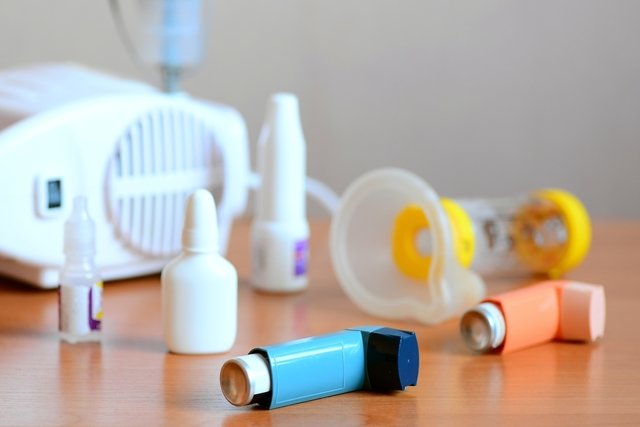Albuterol is a bronchodilator that is prescribed for the treatment, management and prevention of respiratory diseases associated with bronchiole narrowing, like asthma, chronic bronchitis and emphysema. This medication acts on the pulmonary muscles to relax them and facilitate airflow into the lungs.
This medication can be obtained at pharmacies in the form of syrup, pills, solutions or inhalers. It is also commonly referred to as "salbutamol."
Albuterol should only be used as prescribed by a doctor, as it can cause side effects like tremors, headaches or palpitations.

Common uses
Albuterol is indicated or the treatment, prevention or management of respiratory diseases like:
- Severe asthma attacks
- Bronchial asthma
- Chronic bronchitis
- Emphysema
- Chronic bronchospasms
Albuterol in pill or injectable form can also be able to delay non-complicated premature labor in the third trimester of pregnancy.
Minimum age for use
Albuterol can be used in varying ages, depending on the form utilized:
- Inhaler: Adults and children over 6 years
- Pills: Adults and children over 6 years
- Syrup: Adults and children over 2 years
- Nebulizer: Adults and children for 18 months
- IV: Only adults
Dosing in children is calculated by the pediatrician based on the child’s weight.
How to take
The method of use depends on the type of albuterol being used:
1. Albuterol inhaler 100 mcg
An albuterol inhaler consists of an aerosol spray that contains a measured dose to take orally, timed with deep breath.
The amount of puff to take depends on the condition being treated. Normally, the dose for adults is 100 to 200 mcg (or 1 to 2 doses) for the treatment of asthma attacks, acute bronchospasms or the prevention of bronchospasms from exercise or allergies. For chronic treatment, the recommended dose is 200 mcg (2 puffs), up to 4 times per day.
For children, albuterol inhaler use should be oriented by a pediatrician based on the child’s age and condition being treated.
2. Albuterol syrup 2 mg/5mL
Albuterol syrup 2mg/5mL is taken orally before or after a meal. It can be taken by adults or children over 2 years.
Dosing os albuterol syrup varies with age:
- Adults: The dose that is normally recommended is 10 mL of syrup (which is equivalent to 4mg of albuterol), taken 3 to 4 times per day, as per the prescription
- Children over 12 years: The dose normally recommended is 5 to 10 mL of syrup (which is equivalent to 2 to 4 mg of albuterol), taken 3 to 4 times per day, as per the prescription
- Children 6 to 12 years: The dose normally recommended is 5 mL of syrup (which is equivalent to 2mg of albuterol), taken 3 to 4 times per day, as per the prescription
- Children.2 to 6 years: The dose normally recommended is 2.5 to 5 mL of syrup (which is equivalent to 1 to 2 mg of albuterol), taken 3 to 4 times per day, as per the prescription
Duration of treatment should also be specified in your prescription.
3. Albuterol nebulizer solutions
Albuterol solutions for nebulizer use are available as ready-to-use solutions (2.5mg/2.5mL) or in solutions requiring further dilution with saline (5mg/mL). The amount of saline required for dilution depends on the age of the patient and can be used in babies as young as 18 months.
These solutions should be prescribed by a doctor with specific instructions, as nebulizers can be used only as needed or on a chronic basis.
It is important to discard any albuterol solution that was not fully used in the nebulizer, and to avoid reusing the solution for a future nebulizer.
4. Albuterol pills, 2 mg or 4 mg
Albuterol pills are taken orally, and can be prescribed for adults or children over 6 years. They are taken before or after a meal with a cup of water.
The recommended dose for adults is one 2 mg or 4 mg pill, 3 to 4 times a day, as per the prescription.
For children over 6, albuterol dosing should be prescribed by a doctor depending on the age, severity of symptoms, and illness being treated.
5. Albuterol injectable 0.5 mg/mL
Albuterol injectable 0,5 mg/mL is solely used in hospital settings and is administered intravenously, intramuscularly, or intradermally. Doses are prescribed by a doctor on a case-by-case basis, depending on the problem being treated. It is only prescribed for adults.
Possible side effects
The most common side effects that can emerge during treatment are tremors, headaches, increased heart rate, palpitations, mouth or throat irritation, muscle cramps, redness, itching, swelling, shortness of breath or fainting.
Albuterol can cause allergic reactions that require immediate attention. If you notice symptoms like difficulty breathing, throat closing, hives, or swelling of the throat, mouth, tongue or face, you should stop treatment and seek urgent medical attention.
You should should proceed to a hospital if you have additional symptoms like wheezing, chest pain, irregular heart rate, feeling a vibration in your chest, dry mouth, excessive thirst, blurry vision, drowsiness, leg cramps, numbness, tingling, muscular weakness, increased urinary output or pain with urination.
Albuterol can cause an overdose if used incorrectly.
Contraindications for use
Albuterol should not be used by patients with an allergy to this component or any other ingredient in the formula. It should also not be used by people who use non-selective beta-blockers, like propranolol.
Albuterol should not be used by children (unless the form of use is appropriate for their age group), pregnant women, breastfeeding women, diabetics, patients with low blood oxygen levels or patients with hyperthyroidism, unless otherwise monitored by their doctor.
In addition, albuterol should not be used by patients taking corticosteroids, diuretics or xanthins unless indicated by their doctor.
